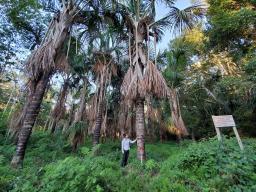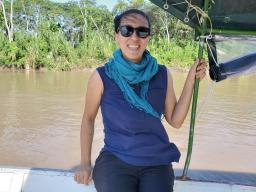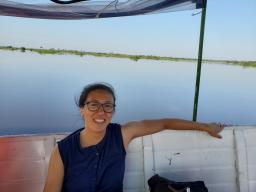Diana Tung is a PhD Candidate in Anthropology at the ANU, and will spend the next 12 months conducting fieldwork in Peru.
Diana is one of two Bernard Wheelahan scholarship recipients for 2020.
I’m currently one month into my stay in Iquitos, Peru, where I will be conducting my anthropological PhD fieldwork for at least a year. At 400,000 inhabitants, Iquitos’ size is almost the same as that of Canberra but that is perhaps where the similarities end. Iquitos is located in the heart of the Peruvian Amazon, and is the largest city in the world that cannot be reached by car.
I’ve spent the first few weeks orienting myself to the rhythms of the city, as well as trying to acclimatize to the intense heat and humidity. I’m thankful that back at the ANU I received excellent advice from linguistics researchers Dr. Darja Hoenigman and Charlotte van Tongeren about conducting research in tropical areas, and have not been completely blindsided by the mould that keeps threatening to grow on my electronics equipment.
With the support of the Bernard Wheelahan Travel Grant I’ve already been able to make significant headway into my research into the social, economic, and environmental status of the aguaje palm (Mauritia flexuosa), and the livelihood strategies of small-scale aguaje entrepreneurs. The palm is very strongly symbolically associated with the city, to the extent that “if you don’t eat aguaje, you’re not from the Amazon.” At the same time, the aguaje is undergoing significant changes in the form of growing international demand as a superfood and cosmetics additive. In turn, this is raising serious concerns over its long-term sustainability.
With the funds from the Bernard Wheelan Travel Grant I have been able to accompany a research team from the Instituto de Investigaciones de la Amazonía Peruana (the Institute of Peruvian Amazonian Research) to three remote villages, where I was able to see how researchers communicated their findings concerning aguaje degradation to local harvesters.
One memorable trip included getting our boat stuck on a sandbar in the middle of the Ucayali River right at dusk. Fortunately I was accompanied by researchers with extensive field experience who were able to dislodge the boat and we were able to continue safely to our fieldsite. Events like this are part of the unpredictability of fieldwork, but also highlight the value of conducting research in situ. Although I’d been told previously about the low-water and high-water seasons in the Amazon, here I was able to understand the implications of such seasonality for aguaje transportation throughout the year.
With what I’ve seen and experienced so far, I’m excited for what the rest of the year in Iquitos will bring. For now, my sincerest thanks to the Bernard Wheelahan Travel Grant and the Australian National Center for Latin American Studies for supporting my research in this corner of the world. My hope is to be able to return to Australia as an active contributor to burgeoning academic interest in the Latin American region, as well as to timely discussions of human-environment interactions and their implications.


